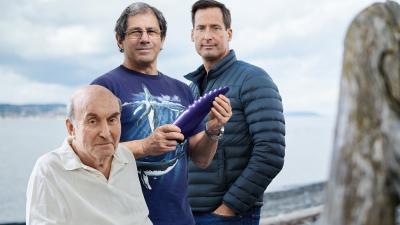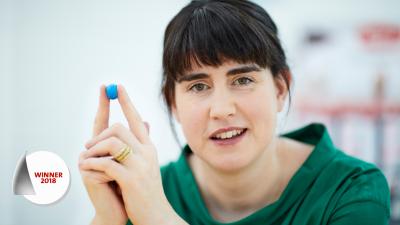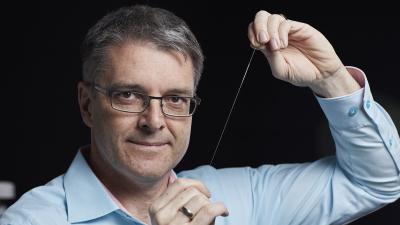Mehrdad Mahdjoubi
Closed-loop shower to save water and energy
Finalist for the European Inventor Award 2018
Mehrdad Mahdjoubi's space-age shower is changing the way we think about domestic water usage, particularly in the bathroom. The Oas, a closed-loop system, was conceived while Mahdjoubi was working on NASA's Journey to Mars project. It filters and reuses water to consume 90% less water and 80% less energy than a conventional shower.
Conventional showers in Europe typically spray out around 10 litres of water per minute, meaning a 10-minute shower can use up to 100 litres of water - a quantity that accounts for about a third of daily domestic water consumption and can be even higher for people who shower more frequently.
Because only a few minutes of each shower are spent rinsing soap and shampoo from our bodies, the majority of the water goes down the drain more or less clean. Instead of wasting this otherwise clean water, Mahdjoubi's shower, which is named after the Swedish word for "oasis" and was developed through his company Orbital Systems, uses digital technology to circulate as little as five litres of water for the duration of a shower.
Societal benefit
Recirculating and purifying water is a new way to save water, and the Oas - the only product of its kind on the market - is currently the most efficient shower system in the world in terms of water and energy savings.
A Master of Fine Arts graduate of the Industrial Design programme at Lund University in Sweden, the 28-year-old developed his idea for the Oas while participating in a collaboration between the university and NASA's Journey to Mars project in 2012. During project work, Mahdjoubi and project members wondered whether it would be possible to establish the same living standard on Mars as on Earth. "It was clear to me that we had to use our resources as cleverly as possible. And that's what we do here," says Mahdjoubi.
Mahdjoubi's shower has obvious advantages both in locations where water is scarce, such as drought-stricken areas, and also where a lot of people shower, such as gyms, hospitals and public pools. According to the UN, water scarcity currently impacts over two billion people - or almost one-quarter of the world's population.
Studies done by the Swedish Institute for Communicable Disease Control have found that water filtered by the Oas is cleaner than tap water. A shower system that ensures disease-free water has obvious benefits for nursing homes and hospitals.
An added bonus is that the Oas user experience is better than that of a regular shower. If someone uses water elsewhere in the house, the pressure and temperature of a conventional shower can fluctuate. But because the Oas is a closed-loop system with comfort-correcting functionality, it is not subject to those fluctuations. Plus, in households where the water flow is restricted or reduced, the Oas can deliver more than double the water flow.
Since the launch of its system, Orbital Systems estimates it has saved over 12 million litres of water.
Economic benefit
Founded in 2012, Orbital Systems has pursued an aggressive intellectual property strategy to protect its position as an innovator in a global market for showerheads and shower panels which is forecast to reach a value of approximately EUR 3.3 billion by 2024. Coupled with this strategy, the company has raised EUR 25 million in investments, including backing from Karl-Johan Persson, CEO of H&M (Hennes & Mauritz), and Niklas Zennström, co-founder of Skype Technologies.
A small company with its headquarters in Malmö, Sweden, and offices in the United States, Orbital Systems employs over 50 people and produces less than a thousand Oas units a year. Given the small production numbers, a unit costs over EUR 3 000, but Mahdjoubi expects the cost of the shower and the filters (EUR 50) to go down as production increases. The first prototypes of the system cost EUR 9 000 each in 2014, but by 2017 the system's price had fallen by two-thirds. In the next couple of years, Mahdjoubi predicts the system should cost about double that of a dishwasher - perhaps as little as EUR 500.
As the company continues to focus on core elements of the technology and place less emphasis on style, Mahdjoubi sees the price of his shower system sinking even further, thereby helping to address the needs of developing countries.
This emphasis on core technology will in future also allow regular showerheads and fixtures to be combined with the system, broadening the options in terms of budget and style.
How it works
The Oas's sensors analyse the quality of the water the same way that nuclear power plants do, by measuring its conductivity (contaminants make water more conductive), which becomes the system's reference point. The water in the system is measured 20 times per second against this reference point and any water too contaminated to be purified is automatically flushed out.
The rest is purified by pumping the water through two filters - a micron filter which removes larger particles such as hair and dirt, and a UV filter, which neutralises micro-organisms in the water, including bacteria, viruses and blood.
Before the purified water is returned to the showerhead, it passes through a heater; as the water temperature drops only a few degrees between the showerhead and drain, it requires very little energy to reheat it. The water is always sterilised before it leaves the showerhead.
Water removed by the system or splashed from the shower is automatically replaced. At the end of a shower, the water is flushed away, with a fresh supply loaded for the next person. An app tracks usage and tells owners when the shower filters should be changed and returned for recycling.
The inventor
Inspired by the art of designing buildings and his architect parents, who are originally from Iran, Mahdjoubi chose to pursue a career in industrial design, having recognised the wide scope of possibilities the discipline offered.
The founder and CEO of Orbital Systems, Mahdjoubi was named in Forbes magazine's "30 under 30" in 2016. The list recognises the most promising young industry and business figures in the world. Mahdjoubi's work developing his shower system has also garnered him a number of other awards, including the illustrious Swedish inventor award - the SKAPA development award - in 2014. He was named Technologist of the Year by the Swedish Chamber of Commerce in the same year.
Mahdjoubi is also a keen footballer, who played in the under-21 football league in Sweden. His former club Malmö has his showers installed in its changing rooms.
Did you know?
Until Mahdjoubi's breakthrough, there had been little innovation in the usage of water in the bathroom in 50 years. For many living in urban areas around the world, it is simply a case of turning on the tap to access vast quantities of water.
It is estimated, for example, that the average person in Mahdjoubi's native Sweden uses 200 litres of water a day - approximately a third of it in the bathroom - and this may be even higher in other developed nations.
Mahdjoubi and his company, thanks to their clever use of digital technology, are helping to change the way we think about water in the bathroom and how we consume this increasingly precious resource. Digital networking is the future, even when it comes to showering: Mahdjoubi has figured out that it can be used to motivate people by showing them how much water they save; plus, an app even reminds them to change the filter.
Media gallery
Patent numbers:
Contact
European Inventor Award and Young Inventors Prize queries:
european-inventor@epo.org Subscribe to the European Inventor Award newsletterMedia-related queries:
Contact our Press team#InventorAward #YoungInventors










